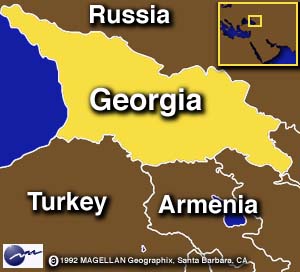EU observers ready to operate in Georgia
 Brussels- More than 300 European Union observers are already in Georgia and ready to begin monitoring the "swift withdrawal" of Russian forces, EU officials said Monday.
Brussels- More than 300 European Union observers are already in Georgia and ready to begin monitoring the "swift withdrawal" of Russian forces, EU officials said Monday.
"We are extremely pleased with the response from member states and with the preparations" leading up to the launch of the mission, foreseen for Wednesday, said Cristina Gallach, the spokeswoman of EU foreign policy chief Javier Solana.
"We want to monitor the swift withdrawal of the Russian troops from where they are now" and ensure that the Georgian police is allowed back into Georgian villages, Gallach added.
The monitoring mission was agreed by EU leaders and Russian President Dmitry Medvedev at a September 8 meeting in Moscow.
On top of ensuring that Russian troops return to the positions they held prior to the August conflict, as promised, by October 10, EU staff will also help monitor a buffer zone in Georgia adjacent to the two rebel provinces of South Ossetia and Abkhazia, in which some 7,600 Russian troops are now based.
Russia had initially asked for at least 200 monitors, but the EU mission will ultimately consist of some 350 staffers from 22 member states, with Germany, France, Italy, Poland and Sweden providing the biggest contingents.
The EU mission has a one-year mandate and is headquartered in the capital Tbilisi.
It also has strong presences in the towns of Poti and Gori.
But Gallach said it was still unclear whether it would be extended to Georgia's two breakaway regions, as originally intended by the EU.
"Now our main responsibility is to ensure that all these guys and girls are ready for October 1," Gallach said, noting that any future deployment would be addressed by diplomats in the coming weeks.
Since the end of the conflict, Russia has recognized South Ossetia and Abkhazia as independent states and insists that any EU presence there would first have to be negotiated with the local authorities.
The EU opposes any break-up of Georgia and has urged other nations not to follow Russia's lead.
The broader issue of Georgia's long-term security is to be addressed in a peace conference scheduled for October 15 in Geneva.
The conference was originally meant to be attended by EU heads of state and government, but it has since been scaled down to the level of diplomats.
However, French Foreign Minister Bernard Kouchner, Solana and other leading EU figures may still decide to attend the talks in some form or other a day before their official launch, diplomats said. (dpa)